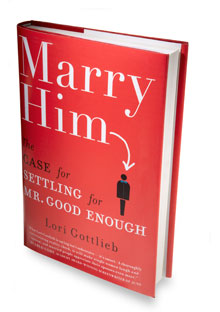Reading Questions for Marry Him
Warning: May contain spoilers

Photo: Ben Goldstein/Studio D
1. In the prologue, Lori Gottlieb realizes that while she'd never made an actual list of qualities she was looking for in a guy, she did have a very specific unconscious checklist in her head. Do you have a list—a physical one or a mental one—of your ideal mate? What would be on your list?
2. Has your "list" from question 1 changed over your lifetime? Are all of the current qualities realistic—or statistically likely—in one person?
3. Do you have a "type"? Is your type consistent with the qualities you consciously look for? Do you run into the same relationship-ending problems repeatedly?
4. What does "husband material" mean to you? Do you think "tall, dark, and handsome" or "long-term compatible"? How have any of your previous dates measured up to your ideal?
5. What does "settling" mean to you? Would you settle for nice life with a nice guy? Why or why not? Do you settle or compromise in other areas of your life? Where's the line for you between making a realistic compromise and settling for something that's beneath you?
6. What does "true love" mean to you? Do you believe in a soul mate? Have you ever thought you'd met your soul mate before but later changed your mind? What do you think of Rabbi David Wolpe's interpretation of "soul mate" in chapter 23?
7. In chapter 3, Lori Gottlieb describes how feminist ideals led her to mix up her priorities when it came to dating, and how the idea of "empowerment" led her away from what she truly wanted. Do you agree that feminist ideals—when applied to dating—have had an impact on women's overall relationship happiness? Do you think women often confuse what they actually want with what a modern woman is supposed to want? What does "having it all" mean to you?
8. Of the qualities you desire from question 1, why are these important to you? Can you separate these qualities into "needs" and "wants," as Lori does in the book?
9. One man in the book says that women expect "one-stop shopping"—a mate who fulfills them across the board—but that he thinks one-stop shopping is overrated because he can get some needs met by his wife, some by his colleagues, and some by friends and family. Do you think women have more expectations in relationships than men? If yes, how? Do you think women, more often than men, focus on the negative in their dates/significant others rather than the positive? If so, why?
10. In chapter 10, Gottlieb recounts social scientist Barry Schwartz's description of maximizers and satisficers. Are you a maximizer in dating? In other areas of your life?
11. Have you ever dismissed a guy after a first date that was fine, but had no sparks? Do you think you worry too much about instant chemistry or common interests instead of about common goals and values?
12. Why do you think it is so difficult to let go of the ideal guy and be less picky in practice?
More discussion questions
2. Has your "list" from question 1 changed over your lifetime? Are all of the current qualities realistic—or statistically likely—in one person?
3. Do you have a "type"? Is your type consistent with the qualities you consciously look for? Do you run into the same relationship-ending problems repeatedly?
4. What does "husband material" mean to you? Do you think "tall, dark, and handsome" or "long-term compatible"? How have any of your previous dates measured up to your ideal?
5. What does "settling" mean to you? Would you settle for nice life with a nice guy? Why or why not? Do you settle or compromise in other areas of your life? Where's the line for you between making a realistic compromise and settling for something that's beneath you?
6. What does "true love" mean to you? Do you believe in a soul mate? Have you ever thought you'd met your soul mate before but later changed your mind? What do you think of Rabbi David Wolpe's interpretation of "soul mate" in chapter 23?
7. In chapter 3, Lori Gottlieb describes how feminist ideals led her to mix up her priorities when it came to dating, and how the idea of "empowerment" led her away from what she truly wanted. Do you agree that feminist ideals—when applied to dating—have had an impact on women's overall relationship happiness? Do you think women often confuse what they actually want with what a modern woman is supposed to want? What does "having it all" mean to you?
8. Of the qualities you desire from question 1, why are these important to you? Can you separate these qualities into "needs" and "wants," as Lori does in the book?
9. One man in the book says that women expect "one-stop shopping"—a mate who fulfills them across the board—but that he thinks one-stop shopping is overrated because he can get some needs met by his wife, some by his colleagues, and some by friends and family. Do you think women have more expectations in relationships than men? If yes, how? Do you think women, more often than men, focus on the negative in their dates/significant others rather than the positive? If so, why?
10. In chapter 10, Gottlieb recounts social scientist Barry Schwartz's description of maximizers and satisficers. Are you a maximizer in dating? In other areas of your life?
11. Have you ever dismissed a guy after a first date that was fine, but had no sparks? Do you think you worry too much about instant chemistry or common interests instead of about common goals and values?
12. Why do you think it is so difficult to let go of the ideal guy and be less picky in practice?
More discussion questions



